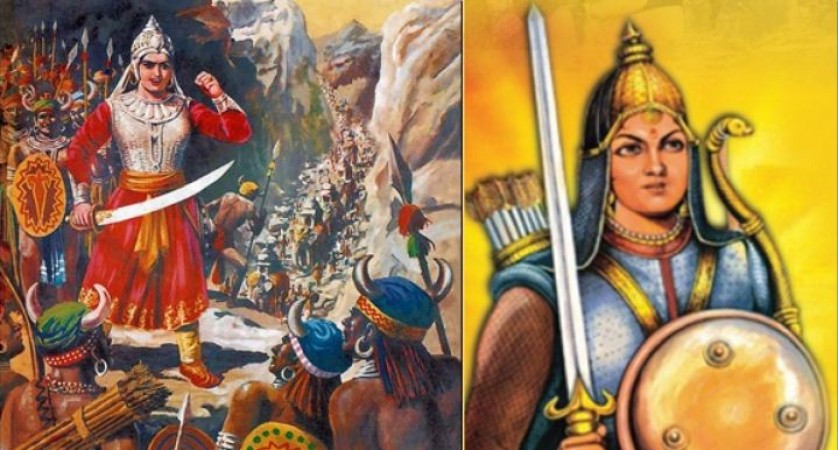
On 24th June 1564, the history of India witnessed the valiant sacrifice of a remarkable queen known as Rani Durgavati. She was a fearless warrior and an astute ruler who governed the kingdom of Gondwana with wisdom and courage. Rani Durgavati's life and her ultimate sacrifice have made her an enduring symbol of bravery and selflessness. Let us delve into the extraordinary tale of this remarkable queen.
Born in 1524 into the Chandela dynasty, Rani Durgavati was the daughter of King Devaraja of the Rajput family. Growing up in the princely state of Kalinjar, she imbibed the virtues of valor and righteousness from her father. Rani Durgavati received an excellent education, which included training in martial arts, politics, and administration. Her education and upbringing played a vital role in shaping her into an exceptional leader.
In 1542, Rani Durgavati married Dalpat Shah, the king of Gondwana. Following her marriage, she assumed the role of queen and actively participated in the affairs of the kingdom. Rani Durgavati was not only a compassionate ruler but also a skilled strategist who made significant contributions to the administration and welfare of her subjects.
During her reign, Gondwana faced numerous external threats from powerful neighboring kingdoms. Rani Durgavati, undeterred by these challenges, displayed remarkable courage and led her army into several victorious battles. Her military prowess and tactical brilliance earned her a reputation as a fearsome warrior queen. Rani Durgavati's leadership skills and ability to inspire her troops made her a force to be reckoned with.
However, Rani Durgavati's most significant battle was fought against the mighty Mughal Empire, led by Emperor Akbar. In 1564, the Mughal forces, under the command of Asaf Khan, attacked the kingdom of Gondwana. Despite being outnumbered, Rani Durgavati fearlessly defended her kingdom. She employed various tactics and strategies to counter the Mughal forces, inflicting heavy casualties upon them.
In the Battle of Narrai, fought on 24th June 1564, Rani Durgavati's forces fought valiantly but were eventually overwhelmed by the sheer size of the Mughal army. Sensing defeat, Rani Durgavati made the ultimate sacrifice. Refusing to surrender or be captured by the enemy, she fought bravely until her last breath. Rani Durgavati's sacrifice became an indelible part of Indian history, and her act of selflessness earned her the title of a true martyr.
Rani Durgavati's legacy lives on as a symbol of bravery and sacrifice. Her name is revered across the country, and her sacrifice is commemorated every year on 24th June as Balidan Diwas (Sacrifice Day). Balidan Diwas serves as a reminder of the courage and resilience displayed by Rani Durgavati, inspiring generations to uphold the values of bravery and patriotism.
The tale of Rani Durgavati serves as a testament to the indomitable spirit of Indian women throughout history. Her story continues to inspire women to break barriers, fight against injustice, and fearlessly pursue their dreams.
Rani Durgavati's contribution to Indian history and her unwavering commitment to her kingdom make her a true icon of courage and leadership. Her sacrifice remains etched in the annals of time, reminding us of the power of determination and the strength of the human spirit.